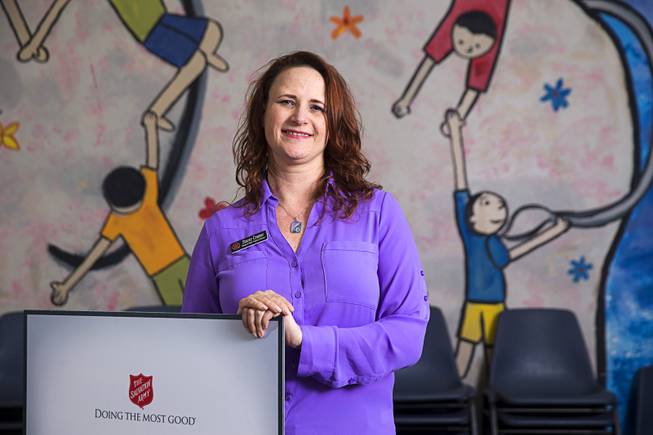
Stacey Cramer, program director for Seeds of Hope, poses by a mural in Salvation Army offices Thursday, Jan. 28, 2016. The nonprofit organization assists victims of sex and labor trafficking. January is National Slavery and Human Trafficking Awareness Month.
Saturday, Jan. 30, 2016 | 2 a.m.
Stacey Cramer sees the ramifications of sex and labor trafficking in Las Vegas on a daily basis. As the program director for the Salvation Army’s Seeds of Hope nonprofit organization, she works with nearly 150 victims a year who have been exploited.
Her program has helped sex trafficking victims — both foreign and domestic — ranging from ages 12 to 60. The victims are predominantly females, she says. Labor trafficking victims tend to be adults, but she has assisted a victim as young as 9.
For 10 years, Seeds of Hope has been aiding victims in finding housing at shelters and getting basic necessities such as clothes, identification cards and birth certificates. The organization also helps with their long-term needs, such as going back to school or getting a job. With the help of law enforcement, Seeds of Hope leaders also guide victims through the legal process if their case is going to court. Cramer says victims are more likely to seek legal action if they have support and feel safe.
“It’s very common for them to get very scared,” she said. “There’s a lot of safety issues for them, and some can be very serious.
“Our goal is to support the victim through that process. And we do find that as we support the victim and they know that there is somebody who is going to be there for them through that process, they’re much more likely to follow through."
Seeds of Hope also works with several other nonprofit organizations at The Center 4 Peace, 3230 E. Charleston Blvd., which houses The Embracing Project, Rape Crisis Center, Nevada Child Seekers and more. There, victims can receive counseling, speak with their case manager and receive various other services at one location.
Cramer and Seeds of Hope leaders have been trying to raise awareness about the issue this month, which is designated as National Slavery and Human Trafficking Prevention Month.
“This is one of those things that the community does not, I believe, realize how big of an issue it is,” Seeds of Hope coordinator Becky Watson said. “It's one of those underlying things in our community, and it's not easy to talk about.”
Las Vegas was identified by a Justice Department risk analysis study as one of 17 cities nationwide most likely to be top destinations for trafficking victims, according to the Salvation Army’s website.
Cramer says Las Vegas is considered a hub for human trafficking partly because of its Sin City culture.
“We have a lot of the professional fighting industry coming in, we have gambling and not only the tourist industry but also conventions,” Cramer says. “So anytime you have conventions coming into any city, you’re going to see an influx in trafficking going on.
“Like around the Super Bowl, anytime you have a major sporting event there’s an increase in that city. And we happen to have all of that every weekend, so it creates a hub because it’s a large market.”
Overall, 50 percent of those receiving aid from Seeds of Hope are 17 and younger, and another 30 percent are 18 to 25. The bulk are juveniles from Las Vegas.
Cramer says trafficking has become a serious issue in Las Vegas also because there are several misconceptions and stereotypes surrounding it, including that sex trafficking only occurs in bad areas of town. Cramer says otherwise.
“Oftentimes there’s sex trafficking going on in every single community,” she says. “It happens in Summerlin, it happens in Aliante, Centennial Hills and even the places you would assume that it’s not happening.”
Other common misconceptions include the idea that people are in the sex trade by choice and that they often have a “specific look” that makes them easy to identify. Cramer says many visitors don’t realize that prostitution is illegal in Las Vegas, as well.
Although Seeds of Hope doesn’t tend to take volunteers to work directly with victims, Cramer says, there are several other areas in which people can assist.
“We need more community partners,” she says. “We can’t do this by ourselves. We need as many people helping and doing this work because there are hundreds of victims. We need hundreds of therapists and we need hundreds of housing programs and everything else to really truly help them overcome that victimization."

Join the Discussion:
Check this out for a full explanation of our conversion to the LiveFyre commenting system and instructions on how to sign up for an account.
Full comments policy